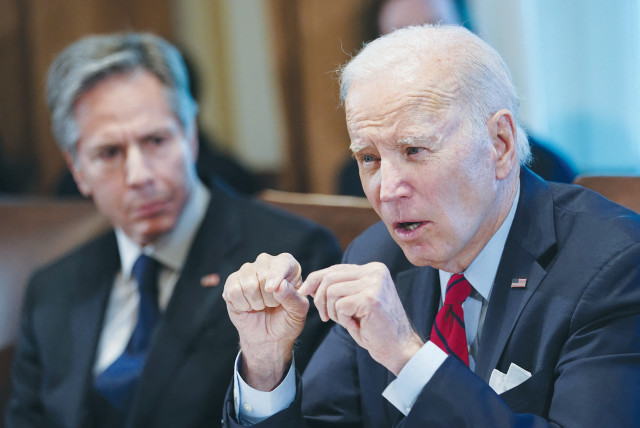Biden calls on Israel not to enter southern Lebanon

The US pushes diplomacy as Israel considers Lebanon ground operation following Nasrallah's assassination and rising regional tensions.
President Joe Biden called on the IDF not to launch a ground campaign into southern Lebanon to root out the Iranian proxy group Hezbollah as tensions appeared to escalate between the two staunch allies over the pending operation, which the security cabinet approved Monday night.
“We should have a ceasefire now,” Biden said during a press event at the White House.
A reporter quizzed him about whether he was aware of and comfortable with Israeli plans to enter Lebanon.
“I am more aware than you might know, and I am comfortable with them stopping,” Biden emphasized.
He spoke as Israel prepared to both celebrate the Jewish New Year starting Wednesday night and put boots on the ground in Lebanon for the first time since the Second Lebanon War. This followed an intense two-week period of IDF bombardment of Hezbollah targets, the elimination of its top command structure, including the assassination of the terror group’s leader Hassan Nasrallah.
The United States has observed the positioning of Israeli troops that suggests that a ground incursion into Lebanon could be imminent, a US official told Reuters on Monday.
US State Department Matthew Miller said that the Biden administration had been told of a limited operation to destroy Hezbollah infrastructure near its border, but that US and Israeli officials were in “continuous conversation” about the issue.
“This is what they have informed us that they are currently conducting, which are limited operations targeting Hezbollah infrastructure near the border,” Miller told reporters.
Asked to confirm they were limited ground operations, he said: “That is our understanding.”
Prime Minister Benjamin Netanyahu told his government at its weekly meeting that “on the eve of Rosh Hashanah, we are in decisive days. These are days of historic achievements but also of major challenges that we face.”
Many in the international community have lauded the Israeli assassinations of Hezbollah leaders but have, in the same breath, urgently called for a ceasefire.
World calls on Israel to refrain from ground incursion
The United States and France want to see Israel and Hezbollah accept the 21-day ceasefire proposal it put on the table last week.
French Foreign Affairs Minister Jean-Noel Barrot visited Beirut on Monday, where he called on Israel not to undertake any ground invasion of Lebanon, adding France will step up its support for the Lebanese army.
“I urge Israel to refrain from any ground incursion and to ceasefire. I call on Hezbollah to do the same and to refrain from any action likely to lead to regional destabilization,” Barrot told reporters while visiting Lebanon.
European Union Foreign Policy Chief Josep Borrell said it was vital to avoid any further military interventions in Lebanon.
“Any further military intervention would dramatically aggravate the situation, and it has to be avoided,” Borrell told reporters from Mexico after an emergency video conference with EU foreign ministers. United Nations Secretary-General Antonio Guterres called for de-escalation.
Indian Prime Minister Narendra Modi posted on X that he had told Netanyahu it was crucial to prevent regional escalation and ensure the safe release of all hostages. “India is committed to supporting efforts for an early restoration of peace and stability,” he wrote.
Earlier in the day, US Secretary of State Antony Blinken stressed that “diplomacy remains the best and only path to achieving greater stability in the Middle East.”
Blinken acknowledged that the Israeli assassination of Hezbollah leader Hassan Nasrallah last Friday made the region and the world “safer.”
“Nasrallah was a brutal terrorist whose many victims included Americans, Israelis, civilians in Lebanon, civilians in Syria, and many others as well.
“During his leadership of Hezbollah, the group terrorized people across the region and prevented Lebanon from fully moving forward as a country,” Blinken said.
Still, he noted, “the United States will continue to work with our partners in the region and around the world to advance a diplomatic resolution that provides real security to Israel and Lebanon” and allows evacuated citizens on both sides of the border to return home. The US is also pushing forward with its efforts for a Gaza ceasefire deal and hostage deal, Blinken said.
His statements fell in line with those issued by the Biden administration in the last days, as they acknowledged the important IDF achievements against Hezbollah while still asking it to prioritize diplomacy.
Miller noted that it was Hezbollah that began attacking Israel on October 8, 2023.” Israel has a right to defend itself against those attacks. That includes targeting terrorist infrastructure inside Lebanon,” he stressed.
Yonah Jeremy Bob and Reuters contributed to this report.
Jerusalem Post Store
`; document.getElementById("linkPremium").innerHTML = cont; var divWithLink = document.getElementById("premium-link"); if (divWithLink !== null && divWithLink !== 'undefined') { divWithLink.style.border = "solid 1px #cb0f3e"; divWithLink.style.textAlign = "center"; divWithLink.style.marginBottom = "15px"; divWithLink.style.marginTop = "15px"; divWithLink.style.width = "100%"; divWithLink.style.backgroundColor = "#122952"; divWithLink.style.color = "#ffffff"; divWithLink.style.lineHeight = "1.5"; } } (function (v, i) { });

